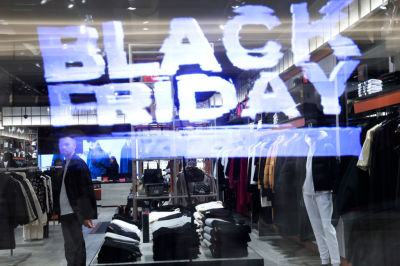Dear Chuck,
I love shopping the Black Friday deals with my friends — it’s a fun tradition for me. My husband says it’s just a marketing gimmick, and I’ll end up spending more money. What do you and your wife do?
Black Friday Shopper
Dear Black Friday Shopper,

My wife, Ann, who helps me with research and insights into every Ask Chuck column, does most of our Christmas shopping. She is not a Black Friday shopper because she finds deals all year round and sees through the hype of the so-called promos this time of year. She offers her insights in our response to your question.
What is Black Friday?
Black Friday falls on November 28th this year. The “deals” go from Thanksgiving evening through Sunday evening and are followed by Cyber Monday. They have become the unofficial start to the holiday shopping season. The name originated back in the 1960s, identifying the time of year when retailers’ books went from red to black — that point in time when they would begin to actually profit from sales. More and more stores recognized the value of increased sales volume with the accompanying foot traffic. It has evolved into a shopping phenomenon.
Today, many companies offer sale prices before these days. Just be aware of price inflation leading up to Black Friday, making discounts deceptive. Recognize emotional marketing that traps consumers into buying unneeded or unplanned items, like “once in a lifetime,” “doorbusters,” and “limited time offer.” I like to remember that nothing is truly scarce or worth pushing and shoving to get.
Overspending is common
According to the National Retail Federation, 197 million shoppers participated in the five days of Black Friday/Cyber Monday sales in 2024. They spent an average of $235 on holiday gifts, including clothing, accessories, toys, gift cards, food, candy, personal care, and beauty items. A survey conducted by Experian found that 63% admitted spending too much during the holidays. 56% felt stressed about their finances during the holiday season. There’s a graph on this website that shows how people overspent. Nearly half of the consumers felt obligated to spend more than they could afford on holiday gifts, making it hard to enjoy the season. A third worried that spending would negatively affect their credit.
Pros of Black Friday
- Save money on needed items that fit your budget.
- Use holiday time off to shop (if time with family is not obstructed).
- Avoid last-minute buying stress.
Cons of Black Friday
- So-called deals may not be the best prices of the year.
- It distracts from Thanksgiving and quality time with your family.
- There is an exposure to crowds, stress, and potential violence.
- A shopping frenzy causes overspending, waste, and overconsumption.
Thankfully, there is a growing trend toward conscious consumerism, leading many people to prioritize sustainability and ethical considerations over discounted prices.
Beware of materialism
John Bunyan referred to the danger of materialism at Vanity Fair in his classic work Pilgrim’s Progress. Christian and Faithful were distracted by all the temptations and then suffered for refusing to participate in the folly.
Charles Dickens visited America several times and was dismayed at the obsession with material possessions and the lack of genuine human connection.
We should prayerfully discern if and how we have fallen for the world’s ways. We can avoid it by being grateful. We can guard our hearts (and wallets) by limiting media consumption and time with people who encourage us to spend too much money — knowing and avoiding our triggers. We can declutter and donate what we do not need while passing valuables on to loved ones.
Celebrate well
Spend time with your family this Thanksgiving! Enjoy this season free of stress. Let the true meaning of Christmas reign in your heart and home. May it overflow to your neighbors and co-workers.
I am all about giving! Just know why and for what you are shopping. Ask family what they want for Christmas. In the years when our kids all get together, we use an online tool to draw names and enter our gift requests. A spending limit allows all to enjoy without the stress of money.
I challenge you to think less about what you want and more about what others need. Ask God how you can help the poor, needy, widows, orphans, prisoners, and persecuted church.
“And he said to them, ‘Take care, and be on your guard against all covetousness, for one’s life does not consist in the abundance of his possessions’” (Luke 12:15 ESV).
Here’s an additional resource you may find helpful:
10 Ways to Avoid Overspending on the Biggest Shopping Day of the Year
If credit card debt is a financial woe, Black Friday shopping can lead to even more stress. Consider reaching out to Christian Credit Counselors. They are a trusted partner of Crown and are able to help consolidate debt and get you on the road to financial freedom.
Chuck Bentley is CEO of Crown Financial Ministries, a global Christian ministry, founded by the late Larry Burkett. He is the host of a daily radio broadcast, My MoneyLife, featured on more than 1,000 Christian Music and Talk stations in the U.S., and author of his most recent book, Economic Evidence for God?. Be sure to follow Crown on Facebook.


















